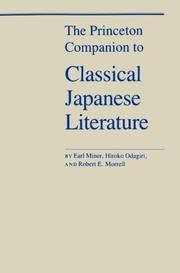| Listing 1 - 4 of 4 |
Sort by
|
Book
ISBN: 1282602101 9786612602108 9047428072 9789047428077 9781282602106 9789004174610 9004174613 Year: 2009 Publisher: Leiden Boston Brill
Abstract | Keywords | Export | Availability | Bookmark
 Loading...
Loading...Choose an application
- Reference Manager
- EndNote
- RefWorks (Direct export to RefWorks)
Kakinomoto no Hitomaro (fl. circa 690) is generally regarded as one of the pre-eminent poets of premodern Japan. While most existing scholarship on Hitomaro is concerned with his poetry, this study foregrounds the process of his reception and canonization as a deity of Japanese poetry. Building on new interest in issues of canon formation in premodern Japanese literature, this book traces the reception history of Hitomaro from its earliest beginnings to the early modern period, documenting and analysing the phases of the process through which Hitomaro was transformed from an admired poet to a poetic deity. The result is a new perspective on a familiar literary figure through his placement within the broader context of Japanese poetic culture.
Kakinomoto, Hitomaro, --- Hitomaro, --- Kakinomoto no Hitomaro, --- 柹本人麿, --- 柿本人丸, --- 柿本人磨, --- 柿本人麻吕, --- 柿本人麻呂, --- 柿本人麿, --- 柿本人麿呂,
Book
ISBN: 0691640637 1400855837 0691612730 9781400855834 9780691065816 0691065810 9780691612737 0691065810 9780691612737 Year: 2014 Publisher: Princeton, NJ
Abstract | Keywords | Export | Availability | Bookmark
 Loading...
Loading...Choose an application
- Reference Manager
- EndNote
- RefWorks (Direct export to RefWorks)
Professor Levy explores the ritual origins of Japanese verse, the impact of Chinese and Korean literary influence on the seventh-century Court, and the rhetorical deification of the imperial family as the condition under which Hitomaro would begin his career as a Court poet.Originally published in 1984.The Princeton Legacy Library uses the latest print-on-demand technology to again make available previously out-of-print books from the distinguished backlist of Princeton University Press. These editions preserve the original texts of these important books while presenting them in durable paperback and hardcover editions. The goal of the Princeton Legacy Library is to vastly increase access to the rich scholarly heritage found in the thousands of books published by Princeton University Press since its founding in 1905.
Japanese poetry --- History and criticism. --- Kakinomoto, Hitomaro, --- Criticism and interpretation. --- Man'yōshū. --- Man'yôsyû --- Man̄yefushifu --- Manʺësi︠u︡ --- Mannyōshū --- Manyŏpchip --- Wan yeh chi --- Nishi Honganji-bon Man'yōshū --- Man.yôshû --- Man'yoshu.
Book
ISBN: 9789004174610 Year: 2009 Publisher: Leiden Brill
Abstract | Keywords | Export | Availability | Bookmark
 Loading...
Loading...Choose an application
- Reference Manager
- EndNote
- RefWorks (Direct export to RefWorks)
J2284.20 --- J5500.20 --- J5710 --- Japan: Genealogy and biography -- biographies -- Nara period (645-794) --- Japan: Literature -- history and criticism -- Nara period (645-794) --- Japan: Literature -- poetry -- Waka, tanka, chōka --- Kakinomoto, Hitomaro, --- Hitomaro, --- Kakinomoto no Hitomaro, --- 柹本人麿, --- 柿本人丸, --- 柿本人磨, --- 柿本人麻吕, --- 柿本人麻呂, --- 柿本人麿, --- 柿本人麿呂, --- Kakinomoto no, Hitomaro

ISBN: 0691008256 Year: 1988 Publisher: Princeton Princeton university press
Abstract | Keywords | Export | Availability | Bookmark
 Loading...
Loading...Choose an application
- Reference Manager
- EndNote
- RefWorks (Direct export to RefWorks)
The description for this book, The Princeton Companion to Classical Japanese Literature, will be forthcoming.
J0930.10 --- Japan: Books and magazines -- history -- earliest, premodern --- J5500.10 --- Japan: Literature -- history and criticism -- premodern, ancient and earliest --- Japanese literature --- History and criticism. --- Abe no Nakamaro. --- Adachigahara. --- Ariwara Narihira. --- Bodhidharma. --- Buddhism. --- China and Chinese literature. --- Confucianism. --- Dōjōji. --- Eboshiori. --- Eiga Monogatari. --- Enomoto Kikaku. --- Fudoki (Topographies). --- Fugashū, Funa Benkei. --- Fūshikaden. --- Genji Monogatari. --- Genroku period. --- Gotoba (tennō). --- Hachimonjiya. --- Haikai Revival. --- Heike Monogatari. --- Hiraga Gennai. --- Ietaka (Fujiwara Ietaka). --- Imagawa Ryōshun. --- Izumi Shikibu. --- Kaidōki. --- Kakinomoto Hitomaro. --- Matsunaga Teitoku. --- Matsuo Bashō. --- Naniwa Miyage. --- Ochikubo Monogatari. --- Oino Kobumi. --- Reizei poets. --- Saigyō. --- ageku. --- bunraku. --- daisan (third stanza). --- gagaku (elegant music). --- gempei. --- jidaimono. --- jōruri. --- kanshi. --- kokindenju. --- maeku.
| Listing 1 - 4 of 4 |
Sort by
|

 Search
Search Feedback
Feedback About UniCat
About UniCat  Help
Help News
News